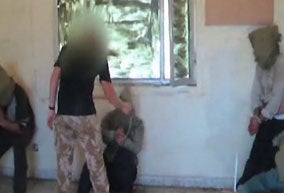Baha Mousa 'killed after father saw soldiers stealing'

Your support helps us to tell the story
From reproductive rights to climate change to Big Tech, The Independent is on the ground when the story is developing. Whether it's investigating the financials of Elon Musk's pro-Trump PAC or producing our latest documentary, 'The A Word', which shines a light on the American women fighting for reproductive rights, we know how important it is to parse out the facts from the messaging.
At such a critical moment in US history, we need reporters on the ground. Your donation allows us to keep sending journalists to speak to both sides of the story.
The Independent is trusted by Americans across the entire political spectrum. And unlike many other quality news outlets, we choose not to lock Americans out of our reporting and analysis with paywalls. We believe quality journalism should be available to everyone, paid for by those who can afford it.
Your support makes all the difference.The Iraqi prisoner Baha Mousa was killed in a revenge attack by British troops because his father had seen soldiers stealing money from a hotel safe, a public inquiry was told today.
Baha Mousa’s father, Daoud, claimed that his son - who suffered 93 separate injuries - had been picked out for particularly brutal treatment folowing his arrest because he had openly complained about the alleged theft to a British officer.
Giving evidence to the inquiry, Daoud Musa, a police officer in Basra, also said that his son’s death certificate was changed at the last minute to admit he had been strangled.Mr Mousa said he had refused to take away the body from a British camp because the document had initially stated the cause of death was a heart attack. The inquiry was shown a copy of the certificate with the word “asphyxia” added following the father’s protests, signed by a Corporal Sharon Cooper.
Baha Mousa died on 15 September 2003 after being detained at the Ibn al-Haitham hotel in Basra,, where he worked as a receptionist, by troops from the Queen’s Lancashire Regiment who said they were looking for weapons. A subsequent court martial in England resulted in the acquittal of six soldiers, including Colonel George Mendonca, the then commanding officer of the regiment which has since amalgamated.
One soldier, Corporal Donald Payne, became the first member of UK armed forces to be convicted of a war crime after pleading guilty to offences under the International Criminal Court Act (ICCA) of 2001 in connection with the death.
Corporal Payne, who had conducted a “choir practice” where the “ music” was the cries of pain from the hooded and handcuffed prisoners as they were being beaten, received a 12 months sentence.
At yesterday’s hearing counsel acting for Corporal Payne, told Baha Mousa’s father, in the witness box, that his client regretted the death and wanted to apologise to the dead man’s family, adding “ I hope you will accept that.” Mr Mousa responded “ I will not accept an apology from a criminal.”
Mr Mousa, repeatedly in tears as he gave his testimony, said he had not been asked to give evidence at the court martial which took place in 2007, and, indeed had not even been informed that the proceedings was taking place. His belief, he said yesterday, was that the savage beating leading to his son’s death was the result of the complaint about the theft.
Mr Mousa, who at the time was working for the Iraqi customs service, said he had witnessed “three of four soldiers” pocketing cash from a safe they had broken open at the hotel and alerted a British officer he knew as “ Lieutenant Mike”.
He “"I thought that it was a violation of English dignity and honour, and the honour of English troops and so I told the officer what I had seen and asked him to give me a signed paper to prove that I had seen the crime and had told him about it.” Mr Mousa also gave a written statement to the British officer who then searched a soldier who, it is claimed, was found with notes hidden in his clothing and told to leave the building.
Mr Mousa subsequently asked that his son, who he saw lying face down on the floor along with others detained, should be freed, partly because of the favour he had done in exposing “ the stealing” by the troops.
"I pointed to my son. The soldiers were standing by I think they knew the one I was pointing to was my son, therefore they wanted revenge against me." He added. "I believe that my son may have been treated worse than other people because I had made a complaint to Lieutenant Mike that money was being stolen from the hotel safe. That is certainly the view that was reached by other men who were detained with Baha."
Mr Mousa said he had no knowledge of claims that the Ibn al-Haitham Hotel had become a meeting place for former members of Ba’athist regime in Basra. He had been “ forced out by Saddam” from his post in the Iraqi police because he was a Shia and because he refused to take action against rebels in the intifada of 1991, he said.
Baha “ hated Saddam “ because of what had been done to his father and, like the majority of the population, had been pleased with the arrival of British troops in Iraq because “ they had got rid of the oppression of Saddam” said Mr Mousa.
“ We welcomed them, we gave them flowers. They were walking about around us in the market” he recalled. “ But we did not expect what took place, the arrests of innocent people.”
The hearing continues.
Join our commenting forum
Join thought-provoking conversations, follow other Independent readers and see their replies
Comments